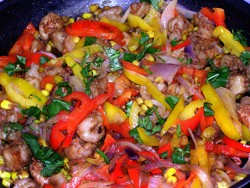Maintaining Food Safety in the Catering Industry
When it comes to the catering industry, food safety is paramount.
Achieving food safety goes beyond proper food handling, including concerns such as food storage, when to cook, reheating and overall staff training in regards to all things food safety. In today’s blog, we’ll be looking at some of the chief culprits of food poisoning and what you should be doing to maintain the quality of your food and the health of your consumers.

Potential causes of food poisoning
Handling food can always be a tricky area to deal with as there are a number of possible ways in which food can start growing unhealthy bacteria. Here are just some factors that could lead to food poisoning:
- Undercooking raw foods – One of the commonly known ways food poisoning can occur is when raw foods such as most red meats and chicken aren’t cooked properly. While meats can be cooked to varying degrees (e.g. rare, medium-rare, medium, well done, etc.), this can still be achieved without undercooking the food. If any food is still raw and not suitable for consumption while raw, this can lead to food poisoning.
- Cooking in advance – Preparatory cooking is allowed, but it’s important that you don’t cook too far in advance. If you do, then that food has the chance of not being maintained properly and harmful bacteria could grow.
- Improper cooling and storage – During transport, it’s important to make sure all food is stored away correctly and maintained at an ideal temperature. Similarly, proper cooling temperatures need to be maintained onsite. If storage or cooling is not being performed to standard, this could allow bacteria to grow.
- Slow reheating – If you’re aiming to reheat food but are taking too long to do so under temperatures that are ideal for bacteria to form (20 to 50 degrees celsius), this can lead to food poisoning. Similarly, allow food to thaw under hot temperatures is a gold mine for bacteria growth. The best approach is to thaw food out in the fridge.
- Poor handling – Poor handling of food by staff can be another point of concern in terms of food poisoning. Particularly, if any of your staff go from handling raw food to handling cooked food without first washing their hands or changing disposable cooking gloves, this can lead to cross contamination, which is another notable contributing cause to food poisoning.
Maintaining food safety
The key to maintaining food safety is to ensure your catering facilities are ideal, your staff are well trained on health and safety hazard and that the cooking of food is done in a logical manner.
When it comes to your facilities, you want to ensure that there is plenty of room for you to prepare food and get it cooking within sufficient time frames. Additionally, you want to freezers and fridges that will be big enough to hold all your goods throughout the course of an event. Never have so much produce that you can’t appropriately store it away.
In terms of your staff, they need to be aware of the health and safety procedures, as well as the best methods of handling food to avoid bacteria and cross contamination. Under no circumstances are they allowed to move from handling raw foods to handling cooked foods without first washing their hands or putting on a new pair of disposable cooking gloves. Even the slightest bit of cross contamination can lead to serious food poisoning concerns.
Along with their own hygiene, your employees need to make sure they don’t commit oversights such as cutting cooked meats on the same board they just cut up raw meats on. The best system is to allocate different cutting boards to different foods. For example, a cutting board for raw meats, one for cooked meats, one for vegetables and one for fruits. It’s a good idea to colour-code your cutting boards to their appropriate produce.
Regardless of how you convey the information, it’s extremely important that your employees (chefs, cooks, kitchen hands, etc.) clean their hands frequently and never cross contaminate.
When it comes to cooking, the idea is that you want the food to cook quickly so that you don’t run a risk of bacteria growth. To achieve this, you need to avoid cooking too many things at once. The more your frying pans and woks are filled with foods, the longer it will take to cook. So cut your food up into reasonable sizes so that you can cook them more efficiently and they can be handed out for consumption ASAP.
What other safety measures do you believe need to be taken in the catering industry to ensure food remains safe and edible? Share your thoughts and tips in the comments below.